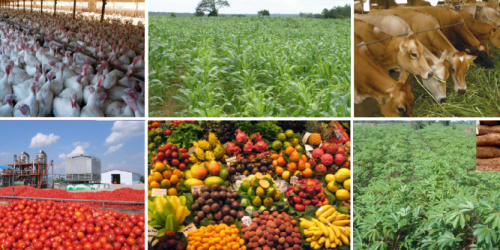For many years, Nigeria’s economy has been strongly correlated with changes in the world oil markets. Oil has dominated exports and served as the primary source of income since its discovery in 1956.
Nigeria is, however, refocusing its economy as the globe shifts to cleaner energy sources and oil prices rise.
A turning point has been observed, according to recent data from the Nigerian Export Promotion Council (NEPC): non-oil exports climbed by 6.26 percent in the first half of 2024, totaling $2.7 billion in income.
This increase is a significant step towards reducing the nation’s reliance on oil.
The Changing Terrain
As a result, the rise in non-oil exports, driven by industry, solid minerals, and agriculture, emphasizes this shift and suggests a new course for the Nigerian economy. Expanding these non-oil industries signals a move away from an economy reliant on oil, which will alter Nigeria’s economic outlook.
According to the NEPC, non-oil exports increased to $2.7 billion in the first half of 2024 from $2.5 billion in the same period the previous year. This change represents a substantial change in Nigeria’s export dynamics, reinforced by the emphasis on semi-processed goods.
During this time, 211 different items, totaling 3.834 million metric tonnes, were exported. These goods included goods from the extractive sectors and agricultural commodities.
Nonye Ayeni, executive director and CEO of NEPC, stated, “We are seeing the results of our diversification strategy, particularly through the ‘Operation Double Your Exports’ initiative.”
“This performance indicates that semi-processed and manufactured goods are gradually replacing raw agricultural products as Nigeria’s main exports,” the speaker continued.
Agriculture Drives Transition
Agriculture is leading the way in this transition. According to the National Bureau of Statistics (NBS), Nigeria’s agriculture industry had robust development in the first quarter (Q1) of 2024, with exports reaching ₦1.04 trillion, up 123 percent from the previous quarter and an astounding 270 percent from Q1 of 2023.
Sesame seeds and cocoa beans were the main exports that caused this spike, with the most demand in Asia and Europe.
The agricultural sector expanded by 1.41 percent in the second quarter (Q2) of 2024, while the oil sector’s GDP contribution decreased to 5.7 percent. This continued the upward trend. This pattern indicates that Nigeria’s economy is progressively becoming more diverse, with agriculture expected to be essential to the country’s future expansion.
Solid Minerals Gaining Traction
Nigeria’s solid minerals industry is another area with great potential. It is growing in importance as the government works to reform the industry for both domestic and global competitiveness.
Solid mineral commerce totalled N134.79 billion in Q1 2024, or 0.42 percent of overall trade. Exports increased dramatically to N63.41 billion, up 143.69 percent from Q1 2023 and 76.77 percent from Q4 2023.
Important exports were N8.62 billion worth of cement clinkers to Cameroon and N17.09 billion worth of tin ores and concentrates to China.
Nigeria has historically underinvested, but its large gold, tin, and limestone assets are drawing attention from private investors.
The solid minerals industry has the potential to develop into a significant source of income, demonstrating the progressive success of regulatory changes intended to improve the economic environment.
This change is reminiscent of a similar trend in Chile, where mineral exports have significantly promoted economic diversification. Nigeria may take a cue from Chile’s success, where mining accounts for a sizable amount of GDP and export earnings.
Manufacturing Boom: Local Production Increases in Nigeria
Another important industry, manufacturing, has grown significantly in Q1 2024. At N6.007 trillion, trade in manufactured items comprised 18.88 percent of all commerce.
Out of this, N268.70 billion was exported, with unwrought aluminum alloys, cathodes, and refined lead being the main goods sent to markets in China, Japan, and the US.
Asia accounted for N148.13 billion of the trade in manufactured products, with Africa and Europe following. The sector’s growth reflects the government’s emphasis on domestic production and a decrease in import dependency.
However, obstacles to this progress include erratic electricity supplies, expensive manufacturing expenses, and competition from lower-priced imports.
Funmi Ogundele, a Lagos factory owner, stated, “The manufacturing sector is vital to reducing Nigeria’s import dependency, but we need reliable power infrastructure to stay competitive.”
Despite these challenges, optimism remains high. Ogundele went on, “We are seeing opportunities to export throughout Africa thanks to the African Continental Free Trade Agreement (AfCFTA), but the government must implement the necessary policies to fully realise this potential.”
The Manufacturers Association of Nigeria (MAN) stated, “Energy prices are affecting its members. “ It went on to say that taxes, the foreign exchange issue, and the expense of transportation are severely hurting a number of firms.



